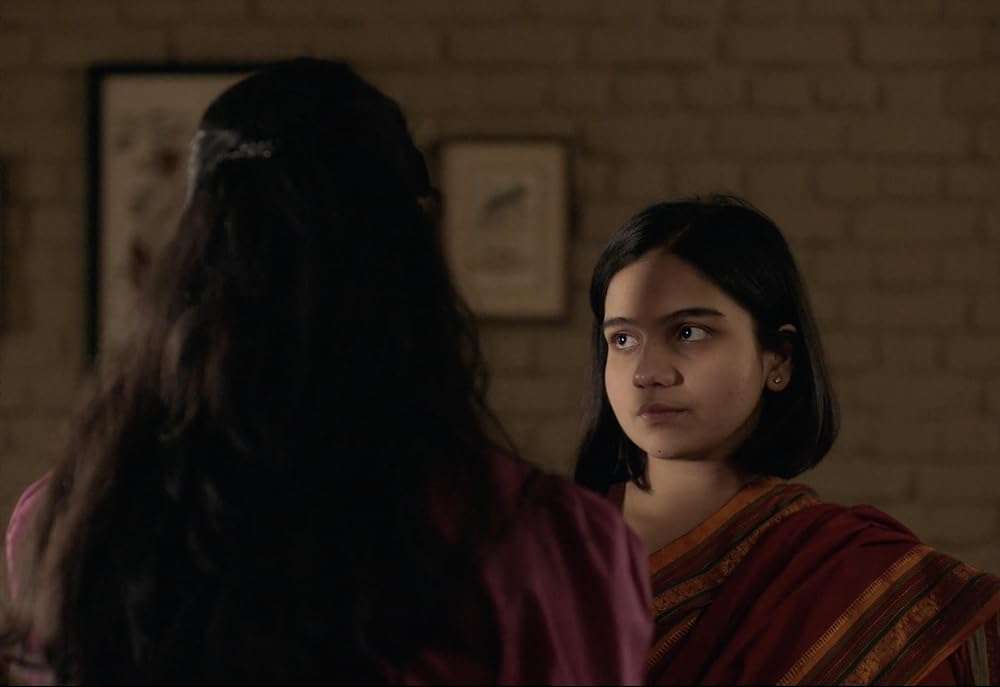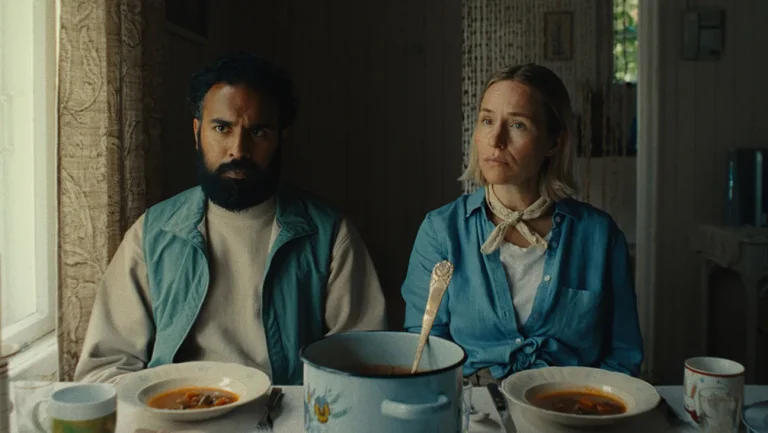At the beginning of the film “Girls Will Be Girls” (2024), sixteen-year-old Mira Kishore from the 12th standard (Preeti Panigrahi in a captivating performance that carries the film as one-half of a terrific two-hander) goes up to the podium to receive her Head Prefect badge at the morning school assembly. Brimming with pride as she pins her Head Prefect badge, Mira gets the assembly to recite the school pledge with her, a scene that doubles up as a subtle form of foreshadowing.
“As a student of my school, I pledge to honor our age-old Indian culture and live according to it,” the pledge goes. With each passing frame, it dawns on Kishore that this vaguely defined and arbitrary concept of ‘Indian culture’ is just another way that women and their sense of agency are curtailed and controlled. Perhaps, this interpretation of ‘Indian culture,’ which has become an insidious excuse to control women’s bodies, doesn’t deserve to be honored. Bestowed with the new Head Prefect badge, Mira believes she has legitimate authority over other students. But in actuality, the school – a microcosm of Indian society – is the institution that maintains authority over everyone, keeping students, including Mira, in line.
And therein lies the success of “Girls Will Be Girls” (2024), the debut feature of Shuchi Talati. Talati sets Mira’s coming-of-age arc against the backdrop of a culture that is vehemently opposed to everything the conventional beats of this arc represent, especially when it comes to women: rebellion, self-awareness, agency, and the need for independence. Can an Indian woman truly come of age in a culture that thrives upon her oppression? Is it possible that Mira can gain sexual and critical awareness, exercising her agency without dishonoring Indian culture? You can see where I’m going with this. Mira’s boarding school is a stand-in for Indian culture. And Mira herself is representative of every Indian woman standing at a crossroads: do you choose yourself and run the risk of becoming a social pariah, or do you choose Indian culture and, consequently, a life of subservience?
I want to highlight how the film details the many ways in which this notion of control and oppression permeates the lived experience of the characters in the film because this interplay is truly fascinating. Firstly, let’s look at the boarding school, where ‘control’ is the unspoken, operative word. You are rewarded for following rules and punished for breaking them. Women are lectured on appropriate skirt lengths – a colonial hangover that my mother informed me was also strictly imposed during her days as a young student in a boarding school – and the burden of not crossing boundaries is more on women than men.
You would think that the privacy of your own home is the perfect sanctuary for Mira to undertake her self-exploration journey, but there’s no reprieve there either. Last year, Kanu Behl’s “Agra” (2023) explored how the claustrophobic nature of shared lived spaces in Indian cities could be viewed as a contributing factor in how sexual frustration builds up among Indian men of a certain age. Talati explores how the lack of privacy and having to constantly share personal space with other adults – even if it’s between two women (Mira shares her house with her mother, Anila) – can be a challenge for a young teen who is curious to explore her sexual side. Everything is constantly monitored and under supervision – why did you close your door? Who was it on the phone? Where are you going? When will you be back? I’m sure all Indian women are familiar with these questions.

The choice of framing the film in a 4:3 aspect ratio in a pillar box format also contributes to this sense of claustrophobia. Mira and her world are, quite literally, ‘boxed in.’ It all adds to this sustained feeling that the walls are constantly closing in on Mira, that the freedom she desires is elusive and always beyond the grasp of her fingertips. There’s a sense of unspoken voyeurism at play here.
The way DOP Jih-E Peng plays with perspective throughout the film – Mira watching over Anila and silently observing what she’s doing and vice versa, while we, as the audience, observe them both play this cat-and-mouse game – adds an extra layer of how the meaning of the word ‘control’ plays out in the household. Everything and everyone is always being monitored, whether it’s at the house or the boarding school. This feeling of being watched is representative of how women feel that their behavior and actions are constantly being surveyed by society, and there’s no relief wherever they go.
The catalyst that kickstarts Mira’s rebellion and self-exploration journey is the entry of Srinivas – who goes by Sri – a new entrant to the boarding school. Having studied previously in Hong Kong, Sri (a deceptively charming Kesav Binoy Kiron) gives the impression that he’s more experienced – sexually and otherwise – prompting the competitive Mira to make sure she can match up to him. To her surprise, Mira finds an unlikely adversary in her own mum, Anila (an excellent Kani Kusruti playing the perfect foil to the rebellious Panigrahi), who also ends up vying for Sri’s attention. Anila finds herself in an impossible situation; on the one hand, she loves the attention she’s getting after being neglected in her own marriage, but on the other hand, the source of this attention could draw a permanent wedge between herself and her daughter.
This dramatic tension bubbles under the surface, and Talati explores the ripple effects of this unaddressed tension through the interpersonal dynamic between Sri, Mira, and Anila. There’s a wonderful dance sequence between our three protagonists that ebbs and flows – both Anila and Mira subconsciously try to assert the upper hand in their equation with Sri throughout.
After Sriram Raghavan’s “Merry Christmas” (2024) earlier this year, this is the second film I’ve seen where a dance sequence that’s not conventionally choreographed (as is the case in mainstream Indian cinema) is used to convey the subtext of a particular moment in the film. Music by Sneha Khanwalkar (so good to see her work now more regularly after a hiatus) and Pierre Oberkampf is minimal, but I do want to highlight two moments that stand out because of the music – one is with the trio as mentioned above, and the other is a beautiful scene where Mira expresses herself unabashedly in front of a mirror before Anila catches her in the act.
In terms of performances, the film is carried by the mother-daughter act of Anila and Mira, respectively. Panigrahi as Mira shows impressive range – being all the rage and fire in one instant, but also capable of remarkable restraint when some of the more complex emotions need to be internalized. Mira can be impulsive, but at the same time, she can be perceptive when the situation demands it. It’s a performance that needs a delicate balance of externalizing and internalizing strong emotions, and Panigrahi walks that tightrope very well. Kusruti is no less as Anila, and it’s this constant push-and-pull between the mother and daughter that is the engine of this film. Anila is caught between two worlds: between choosing her daughter’s happiness and finding her own, and Kusruti pitches that dilemma just right so that the audience can see both perspectives, the mother’s and the daughter’s.
For all its simmering dramatic tension, “Girls Will Be Girls” (2024) is an intimate and quiet film. It’s more about the cumulative effect of how women might be oppressed – not through grandiose acts of easily identifiable wrongdoings (unlike the Zoya Akhtar and Reema Kagti school of thought, see “Dahaad” for example) – but through everyday microaggressions that add up over time. For me, this made the result even more powerful. Mira and Anila will be just fine. We just need to let them be.



![The Rapist [2022]: ‘KIFF’ Review – Konkona’s spitfire, soul-baring performance fails to lift this leaden dud](https://79468c92.delivery.rocketcdn.me/wp-content/uploads/2022/05/The-Rapist-2022-768x433.jpg)



